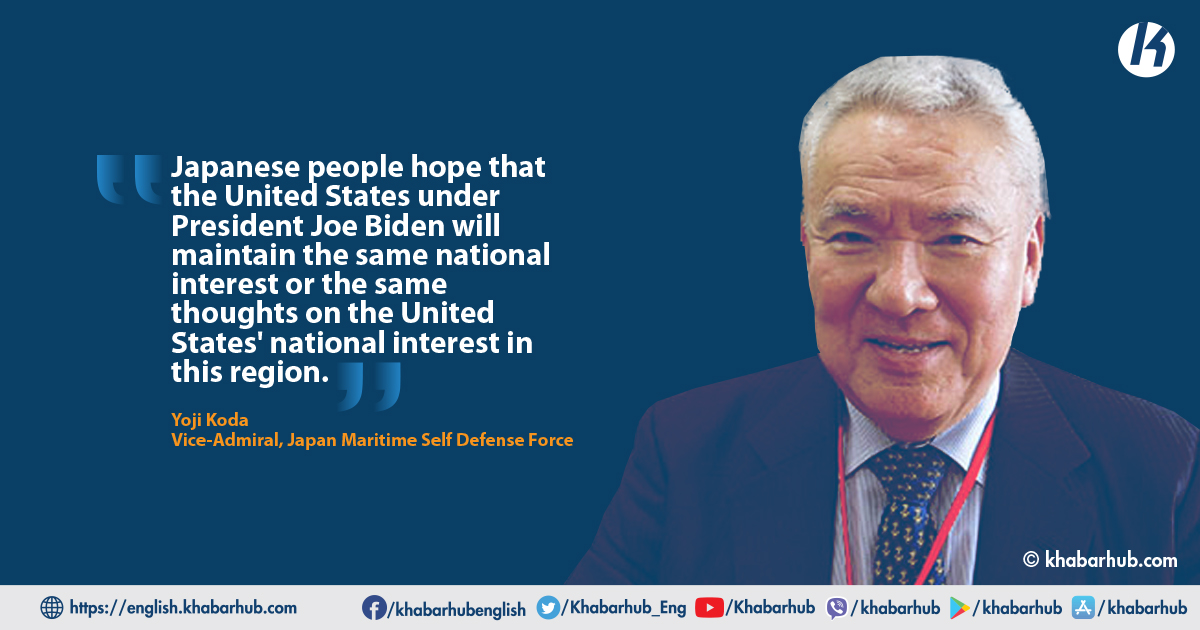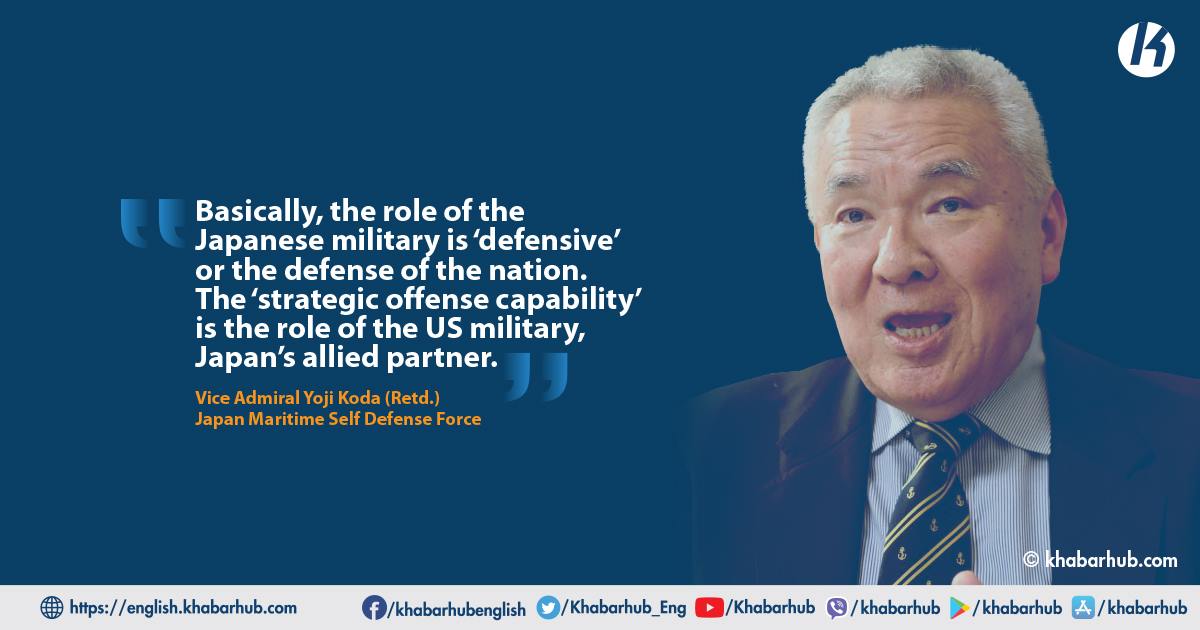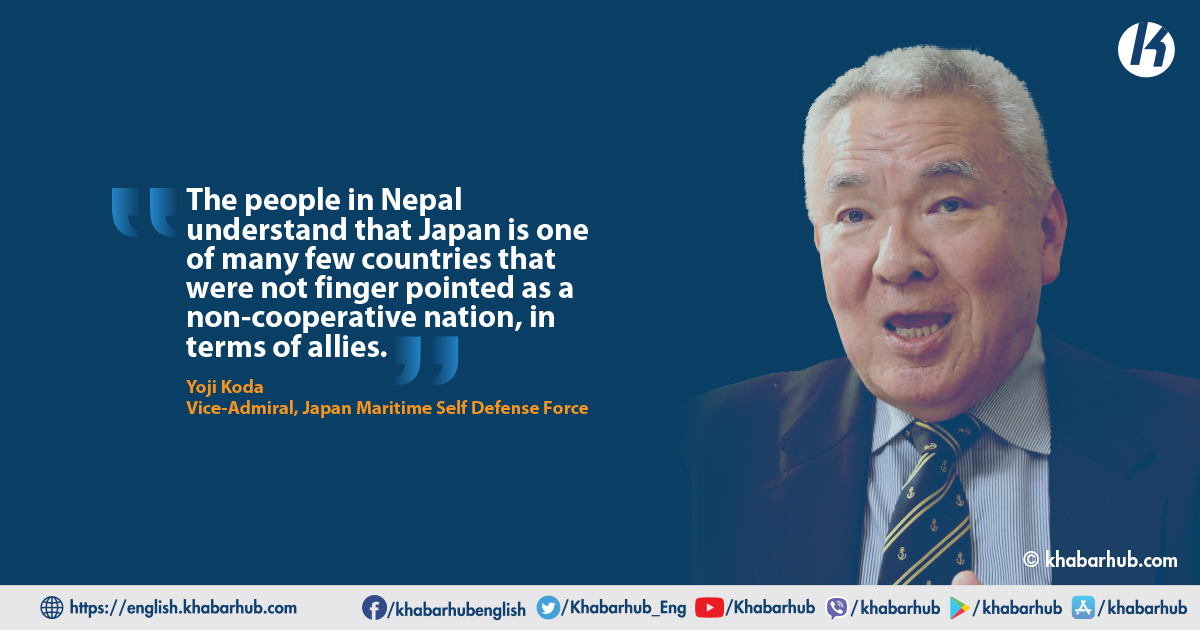Yoji Koda is Retired as Vice-Admiral of Japan Maritime Self Defense Force with surface warfare specialty and he is former Commander in Chief, Japan Maritime Self Defense Force.
He is a graduate of the National Defense Academy (NDA: 1972) and in 1991-1992 he was a student of Naval Command College at the U.S. Naval War College.
After 40 years’ service in National Defense Academy and Japan Maritime Self Defense Force, he served as Commander in Chief, Self Defense Fleet, from 2007 until his retirement in 2008.
In 2009-2011, Koda became a senior fellow at Harvard University’s Asia Center, where he worked on the Chinese naval strategy.
He had served as an advisor to the National Security Secretariat. He is an (erudite) erudite strategic thinker and an engaging speaker on naval power and contemporary security subjects.
He also is a proficient writer on maritime affairs and military history. His recent articles include: “Japanese Perspective on China’s Rise as a Naval Power,” (Harvard Asia Quarterly, Winter, 2010) and “Maritime Strategy and National Security in Japan and Britain” (Leiden and Boston, Global Oriental, 2012).
Dr. Pramod Jaiswal, Strategic Affairs Editor at Khabarhub, spoke to Yoji Koda on Japan and East Asia Security.
What are your observations regarding the evolution of Japan’s National Security Strategy over the years? What are Japan’s current strategic policy challenges and opportunities?
Japan has been and still is a very unique nation and the current so-called “Pacifist Constitution”. So basically, the role of the Japanese military is ‘defensive’ or the defense of the nation, and the ‘strategic offense capability’ is the role of the US military, Japan’s allied partner.
Under this framework, Japan has enjoyed and appreciated the stable situation since the end of the second world war until today.
Having said that, the recent changes in this area, especially after the cold war, sometime around the change of the century, from the 2000s to today, more than 20 years, China emerged as a great power both in the economy and militarily.
Additionally, Japan’s proximity to China and also Japan’s historic relationship with China make the Japanese strategic thinking very unique.
In the past, Japan has tried to maintain a stable relationship with China, but recently the Chinese challenges backed by its economic power have changed the Japanese view and for the first time the Japanese people have started perceiving China as a real physical threat to Japan’s security.
This is the real cause of the evolution of Japan’s new National Security Strategy.
There are various challenges imposed by China’s stronger economy and military to Japan’s Strategic Policy. When it comes to the opportunities, there remain many areas for Japan to cooperate with the ASEAN nations.
Japan has been strengthening its allied relationship with the United States and Europe. To make a long story short, Japan has started pointing or singling out China as the real practical threat.
Lately, Tokyo has been issuing more strong statements in backing Taiwan against Chinese coercion. It has even been hinting at military support if any prospective aggressions are to occur. How do you view Japan’s newfound willingness in defending Taiwan?
The important thing to consider is that the Japanese view of Taiwan remains the same. First, Taiwan after 1949, has been a part of the western nation and recently a real democratic nation, and also geography is very important.
The geographic location of Taiwan is the eastern entrance or the eastern approach to the South China Sea. So, Taiwan’s geography has strategic importance.
So, Japan has been seeing Taiwan as the key nation for Japanese security and economic survival. So, what has changed since then?
The Chinese assertive and self-righteous actions in this area, especially the Chinese intent to unify Taiwan as part of China.
Hence, this is the practical issue of whether Taiwan is part of China or not? Of course, Japan understands the Chinese claim that Taiwan has been an indisputable element of Chinese territory. Japan understands the Chinese position but we do not necessarily agree with the Chinese position.
Japan weighs more on the freedom of about 25 million Taiwanese people. So, as long as they want to maintain a separate political status from the mainland, Japan would support Taiwan.
The key change in recent years is that China has started challenging Taiwan’s autonomous political maneuvers and free maneuvers through the Chinese stronger military and economy.
So, if that is the case, Japan would support it because the freedom of the people is the fundamental element of human beings. It overrides almost everything, political position or military intent.
Simply put, Japan still weighs more or puts a higher priority over the human rights or the freedom of the Taiwanese people.
So, until the Taiwanese people agree with the unification of Taiwan to the mainland, in that case, Japan will keep silent. However, if China tries to unify Taiwan by military means Japan will make a stronger opposition to Chinese maneuvers.

But one thing we have to pay attention to is, Japan has not supported the idea of sending Japanese forces to Taiwan or fighting directly against China militarily.
Japan has many roles, e.g., what has been and what will be the deterrence power against Chinese willful intent that is the US military presence.
So, the Japanese role in the Taiwan crisis is, first, to enable US presence in this area to protect Taiwan for deterrence.
If a real military operation happens, Japan will be in support of the US operations but not direct involvement of the Taiwan operations, e.g., Japan will contact the wide-area surveillance in the East China Sea and western pacific but that is not the direct military action against China.
So, Japan has a responsibility to protect Japan’s territory neighboring Taiwan. Only 100 km east of Taiwan, there are a group of Japanese islands. Japan should protect itself from any military action.
Additionally, Japan is an allied country of the US, so Japan would be responsible to logistically support the US operation.
Hence, the best way to describe it is, in a real Taiwan scenario, Japan will be in full support of US operations, indirect support of the US operations especially in the logistics areas and US forces need huge logistics in case of real combat. So, this is Japan’s role.
How has Japan perceived China’s new maritime rules designed to control the entry of foreign vessels in what Beijing calls “Chinese territorial waters” in the disputed South China Sea? Is it likely to cause more rift or spike tension in the South China Sea?
Yes, that’s correct. Two major issues, one is under the UNCLOS [United Nations Convention on the Law of the Sea] or the maritime international law, every ship, regardless of its nature, military ships or the commercial ships, have the right to international navigation in any nation’s territorial waters without doing anything.
This has been a long maritime custom for more than a century. China has been trying to break this long lasted, fairly established interpretation and contact of the sailors or mariners in terms of the international passage of navigation.
China is requesting information on what you are, where you are going and what you are carrying. Thus, China is trying to break the most widely accepted international maritime customs and norms by its domestic regulations. This is the challenge of the international norm.
The second thing, China says, it’s their territorial waters. Where are the territorial waters? Or where are the Chinese territorial waters?
The definition is very uncertain. So, China may say this is my territorial waters, but the other nations where the ships belong deny it, they claim that this is international waters. There would be another conflict of the interpretation of the territorial waters of China.
Hence, this may generate very hard and difficult conflict and chaos at the maritime shipping especially in the South China Sea where China claims the disputed water.
And if this happens, international maritime traffic in Asia will be destroyed. Therefore, the Chinese new intent or new declaration of the regulation of the territorial water has imposed the real physical and practical challenges towards the established, and universally agreed international norm of international maritime traffic. So, this is very dangerous.
How has US policy towards Asia, particularly Japan changed after the Trump Administration and how will the relation be after Japan elects its new Prime Minister? How can the US and Japan together neutralize China’s growing presence in the South China Sea?
The people in Nepal understand that Japan is one of many few countries that were not finger pointed as a non-cooperative nation, in terms of allies.
For instance, most NATO nations, the Trump administration, or President Trump himself, said that they need to spend more than 2 percent of the GDP but what they are spending now is less than 2 percent, or the treaty obligation of the alliance is not doing well.
But Japan, in 4 years of the Trump administration, wasn’t attacked, or condemned by the Trump Admin, because of the past relationship or past facts of Japan’s contribution to the alliance and also to the stability of the region, I think that President Trump understood.
So, in this regard, I don’t think there will be big changes, even after the transition from President Trump to President Biden.
Thus, the US-Japan relationship, especially the security relationship will remain fairly stable in the coming years. That’s my first point.
Second about the new PM, that’s a big issue. One more thing is very clear, historically, after the war, whatever the government is there, the Japanese government, no exception, will be made to maintain the US-Japan relationship or alliances.
In this regard, whoever the new PM of Japan will be, the US-Japan relationship will not change and will remain fairly stable.
And of course, Japan may ask, or make its Japanese position very clear in support of the US new strategy towards Asia or the pacific area.

So, there will be, homework, that’s Japanese government should solve to improve the US-Japan relationship, but I don’t think the change of the Japanese government will have almost any impact on the relationship.
How US-JAPAN can neutralize, is the point, especially in the cold war days until today, alignment of the strategic concept between the US and Japan has been pretty good.
Military-to-military cooperation in defense of Japan has been very good. That e.g., in the case of the Taiwan scenario, do we have any operation plan or strategic thoughts, or do the US and Japan have orchestrated and aligned strategic thinking in terms of military operations in case of a specific crisis in Taiwan or the South China Sea is to occur.
Other than Japan’s contingents, US-Japan in the past has used the alliance to defend Japan. Moreover, a lack of ample coordination or alignment of strategic thoughts has been made in the past.
Hence, both the governments, their military, and foreign services have already started this business. It may take maybe a couple of more years but we know what to do here.
What are Japan’s expectations from the Biden Administration in the face of Beijing’s aggressive actions on the maritime, diplomatic and economic fronts towards Japan?
One disappointing and heartbreaking thing was President Obama’s announcement that the United States is no longer the world policeman.
This sent the wrong signal to Beijing. We believe that US interest in this region remains the same. So, the Japanese people hope that the United States under President Biden will maintain the same national interest or the same thoughts on the United States’ national interest in this region.
This is the key thing because what are the drivers of each national military strategy or the security strategy? Each nation has its national interest and this is the primary engine that drives each nation.
In the case of US-Japan separate alliances, both the US and Japan have aligned their national interests pretty well. So, maybe, eighty percent of our national interest has been alike.
This eighty percent drives and brings the US and Japan together. Hence, if the Biden Administration denies it that is when our alliances will be jeopardized.
If that is the case, the stability in this region is also in crisis or jeopardized. So, what Japan expects the Biden Administration to show or maintain is to send a very clear signal that most of the US security interests and the national interests still reside in this region.
Therefore, the US-Japan alliance is the core to support this posture/framework. These are the key things that Japan wants the US Biden Administration to do in the future.
What implications and meaning does the successful test launch of Russia’s new Zircon hypersonic cruise missile have on the maritime security of QUAD countries? Will this accelerate more proliferation in the region?
In some areas especially the AI or the tactical missile or the ballistic missile, both China and Russia are almost in parallel or ahead of the development efforts of the US.
So, this Russian Zircon missile is one of the examples because the US is technically doing a lot of research. But tactical and military implications are not yet defined.
Russia has already made its first test launch of Zircon from its warship. We are still quite not sure what the tactical and military implications of those new missiles are. Of course, the military in general, this is a very dangerous weapon.
Also, we have to pay very serious attention to these new developments. Because for example, the special US question is on QUAD.
QUAD is a typical maritime cooperation framework. Hence, any naval forces operating in this region will be a target of these high-tech missiles.
So, four nations or other like-minded nations in ASEAN have to do a lot of effort to protect their naval forces. As the naval forces are the bondage agent to bring our four nations or many other nations together.
We should have the capability but this Zircon missile will be a bondage agent to bring our like-minded nations together because we may jointly develop our countermeasures.
But still, my point is if we do nothing, we will fail. We need to do something. This is part of the US-Japan strategic alignment.
And we invite other people to jointly develop and felt those countermeasure systems. The proliferation is a very difficult question.
But my point is it’s just a matter of time, China would deploy and employ these types of missile systems, the matter of time may be within a few years.
But the key thing is we need to develop our own; first, defense capability, and second, we need to develop our offensive capabilities using this type of missile.
But still, these are very expensive missiles. So, using the conventional missile is much more feasible for rigorous military operations.
The US and Japan have not come to the conclusion yet. So, whether to employ or what kind of offensive missile system to employ would be another question. But anyway, we need to put in some effort. Both defensive measure and offensive measure.
The Great-Power battle is playing out in Antarctica and Japan’s recent demand that it should be among the countries allowed to exploit resources lying below the surface in Antarctica was met with huge outrage in Moscow asserting the claim to be a threat to Russian rights in the Antarctic. How does Japan view Moscow’s response and what are Japan’s claims on the southern polar region?
The first thing that is happening in the Antarctic Ocean and the Arctic Ocean is something very similar to the South China Sea.
Moscow or Russia is claiming the Arctic ocean as their water regardless of its EEZ or territorial water. Russia claims those waters regardless of the 200nm EEZ.
So, this is very similar to what China is saying regardless of the 200nm EEZ claiming the South China sea. We have to be strict on the interpretation of UNCLOS.
Anywhere out of 200 nm is the high sea for everybody. So, in theory, and principle, those neutral areas or high seas areas, even in the Arctic Ocean or the South China Sea belong to nobody.
If any nation has an intent and capability to mine on the Sea-bed natural resources, it should be free to do so. Unless or until any International agreement or treaty is concluded.
And since there is no treaty, the Japanese do not accept and acknowledge Moscow’s position of monopolizing the Arctic ocean.
The Southern Pole resembles Antarctica, right? There is already an international treaty. Thus, as for Antarctica- the South Pole region – for every nation involved in any activity in that region, there is only one Principle and rule; that is the Treaty over Antarctica. We should follow that treaty until this current treaty will be rewritten or revised,
Recently Japan has been developing a ‘hypervelocity gliding projectile’ (HVGP) with anti-ship capabilities that is said to be capable of decimating warships. How similar is the HVGP to the hypersonic weapons of Russia and China? Why does Japan need HVGP?
The rise of China casts a dark shadow over the Japanese Western front. We just discussed between Taiwan and Kyushu; that’s the largest Southern island – the distance is about 1500km.
There is a long-stretched line of islands, difficult to protect and so close to China. Also, there are many choke points (choke points are the narrow channel) that Chinese forces have to pass when they try to go out or come back from the Pacific ocean.
We call the Western Island chain of Japan, a critical area for Japan to protect and also to control the Chinese military ambition.
But, key things, how can Japan defend those islands. There should be many ways of course placing the defense forces, ground forces over major islands; it’s one thing.
Japan has already started. But in the case of island defense forces, ground forces alone cannot protect. So, the second means of course to maintain air superiority is by fighter jets and anti-air missiles.
The third thing is to protect the evading forces or shipping as long as possible. Japan needs it and will need a long-range anti-air missile to attack incoming invasion forces, and of course, isn’t easy.
The longer the range is better the protection would be. Japan started developing several types of long-range weapons.
One thing is conventional long-range cruise missiles; range of about 500 to 1000nm. Cruise missiles of course are cheap and good but still vulnerable to the entire area of firing.
Thus, a bit expensive but more survivable chance is of anti-ship missile weapons. One of the candidates is the Hyper Velocity Projectile.
We need to make precise surveys over the Japanese system and the Russian or Chinese system. Japan is still in the phase of development, especially on how to hit the targets at a very high speed.
It’s a very difficult technology. Japan is still making some efforts. It may take several more years to complete the developments.
Then we can talk about implications. I would say another five to ten years. But the reason is very simple: to protect the Western Island chain.
That is the part of the first island chain. Defending this chain of islands would be a very important strategic mission for Japan to carry out.









Comment